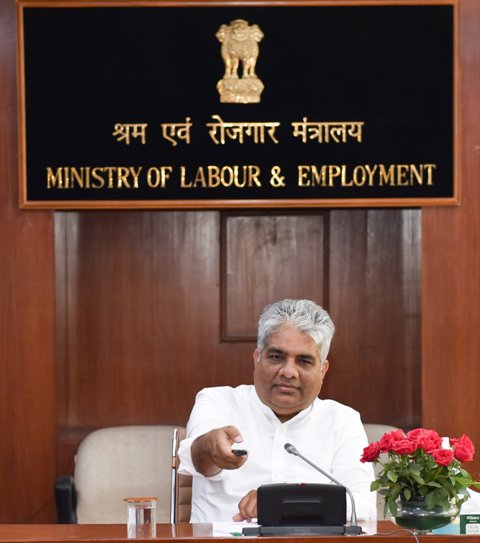Bhupender Yadav Charts India's Green Future at CII Business Summit 2025
Shri Yadav’s address served not only as a status report on India’s domestic climate action but also as a policy blueprint for other emerging economies.

- Country:
- India
In a powerful address at the Confederation of Indian Industry (CII) Annual Business Summit 2025, Union Minister for Environment, Forest and Climate Change, Shri Bhupender Yadav, outlined India's evolving climate policy framework under the theme "Building Trust – India First". Speaking during a Special Plenary Session titled “India’s Climate Policy Architecture: Pathways for Emerging Economies”, the minister presented a compelling vision of how India is harmonizing growth with environmental stewardship, trust with transformation, and national interest with global responsibility.
Positioning the "India Story" as a unique blend of tradition and transformation, Shri Yadav emphasized the nation’s journey where democracy coexists with development and compassion meets climate action. His speech reaffirmed India’s leadership in sustainable development, urging businesses to take active ownership in the climate transition process.
Mission LiFE: Transforming Environmentalism into a People's Movement
A focal point of the Minister's address was the transformative impact of Mission LiFE (Lifestyle for Environment), a flagship initiative launched by Prime Minister Narendra Modi. The mission, according to Shri Yadav, transforms climate action from a policy prescription into a participatory lifestyle change movement, where individuals, communities, and businesses are stakeholders.
“Mission LiFE empowers people to adopt simple, planet-positive actions in daily life,” he explained. “By encouraging behavioural change, we are turning environmental protection into a collective responsibility.”
The program’s community-led campaign, "Ek Ped Maa Ke Naam", which encourages citizens to plant a tree in their mother’s name, is already seeing strong nationwide participation, symbolizing emotional and ecological bonding.
India’s Climate Architecture: Three Pillars of Progress
Shri Yadav laid out the pillars of India’s climate policy architecture, reflecting a robust and inclusive strategy grounded in economic innovation, natural conservation, and adaptive resilience.
1. Self-Reliant Circular Economy
India is moving away from a linear "take-make-waste" economic model to a circular economy that optimizes resource use and minimizes waste. Under this transition:
-
Extended Producer Responsibility (EPR) guidelines are being enforced for plastics, batteries, tyres, and e-waste.
-
Investments of over ₹10,000 crore (2022–2024) have already been made in the recycling and resource efficiency sector.
-
By 2050, the circular economy is projected to be worth $2 trillion and create over 10 million green jobs.
Shri Yadav urged industry leaders to take this opportunity to both grow sustainably and contribute to national development. He extended an invitation to join the Resource Efficiency and Circular Economy Industry Coalition, a G20 initiative promoting industrial cooperation and policy alignment.
2. Protecting Ecosystems and Fostering Community Resilience
Environmental preservation is core to India’s climate policy. Mission LiFE and associated schemes like the Green Credit Programme offer incentives for voluntary ecological actions, ranging from afforestation to resource efficiency.
Shri Yadav emphasized India’s intent to embed community-driven conservation into mainstream development. “We must empower our villages, municipalities, and citizenry to lead environmental initiatives from the ground up,” he stated.
3. Climate Adaptation and Resilience Building
With increasing exposure to climate-induced risks, India is prioritizing adaptation alongside mitigation. The country is finalizing its first-ever National Adaptation Plan, which will be submitted to the United Nations Framework Convention on Climate Change (UNFCCC).
This strategy includes:
-
Enhancing the adaptive capacity of vulnerable communities
-
Strengthening climate-resilient infrastructure
-
Developing a Climate Finance Taxonomy, which classifies green projects for targeted investments and reporting
India: A Trusted Global Climate Partner
In his concluding remarks, Shri Yadav asserted that India has emerged as the world’s most trusted partner in the global climate discourse, thanks to its:
-
Political stability and visionary leadership
-
Inclusive climate policies
-
Strong cultural ethos rooted in environmental respect
In an era of geopolitical tensions and climate uncertainty, he noted, India's approach of "trust and transformation" is being widely recognized and appreciated by global stakeholders.
Industry as a Driver of India’s Green Growth
Calling upon CII members and industry leaders to be partners in this mission, Shri Yadav emphasized that India’s economic future is inseparable from its environmental future. He urged corporates to:
-
Embed circular principles in operations
-
Invest in sustainable technologies
-
Join government-industry coalitions on green growth
-
Promote environmental awareness within their workforce and supply chains
“Environmental sustainability is not just a government agenda—it’s an industrial opportunity, a citizen’s duty, and a moral imperative,” he stated.
Shaping the Climate Agenda for Emerging Economies
Shri Yadav’s address served not only as a status report on India’s domestic climate action but also as a policy blueprint for other emerging economies. His articulation of climate equity, just transition, and local-global synergy underscores India’s leadership role in aligning development priorities with climate obligations.
As the world approaches critical climate milestones, India's example may provide the template for inclusive, scalable, and sustainable growth models, especially across the Global South.
- READ MORE ON:
- Bhupender Yadav
- CII Annual Business Summit 2025
- Mission LiFE
- India climate policy
- circular economy
- green jobs
- National Adaptation Plan
- Green Credit Rules
- climate finance taxonomy
- Indian environment policy
- Ek Ped Maa Ke Naam
- UNFCCC
- sustainable development
- industry climate action
- G20 environment initiatives










